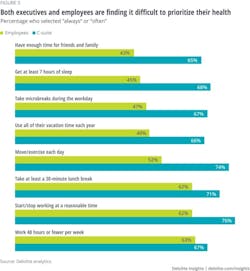The well-being of all employees moved front and center as a result of the pandemic. Many companies created a number of programs or communicated existing programs all with the goal of addressing these issues. Even with these efforts, it seems as though there is still a lot of work to be done to address these concerns.
Deloitte surveyed 2,100 to survey 2,100 employees and C-level executives across four countries: the United States, United Kingdom, Canada, and Australia to see where companies are in their well-being journey.
Everyone seems to agree on how important well-being is, with 68% of employees and 81% of the C-suite saying that improving well-being is more important than advancing their career. In fact, nearly 70% of the C-suite are seriously considering quitting for a job that better supports their well-being.
But employees, 56%, do think their company’s executives care about their well-being, while 91% of the C-suite think their employees believe they care about it. Even while caring there is a disconnect as illustrated by the graph below.
So what’s getting in the way? In one word – work. Most employees (83%) and executives (74%) say they’re facing obstacles when it comes to achieving their well-being goals—and these are largely tied to their job. In fact, the top two hurdles that people cited were a heavy workload or stressful job (30%), and not having enough time because of long work hours (27%).
Overall, 63% of employees and 73% of the C-suite reported that they aren’t able to take time off and disconnect. When asked why, respondents said that they have too much work to do (24%), they want people to know they’re dedicated to their job (22%), and no one would be able to cover for them while they’re away (22%). One out of four executives said they don’t disconnect because their workload would be unmanageable when they return (25%) and they’re afraid they would miss out on important messages or emails (24%).
“We uncovered that both employees and the C-suite are struggling to prioritize their well-being—and for most people, work is to blame,” the authors of the article said. “However, executives are significantly overestimating how well their employees are doing and how supported they feel by their leaders. And there are other disconnects as well, indicating that the C-suite should be doing much more to understand the needs of their workers and demonstrate that they truly care about their holistic well-being.
About the Author
EHS Today Staff
EHS Today's editorial staff includes:
Dave Blanchard, Editor-in-Chief: During his career Dave has led the editorial management of many of Endeavor Business Media's best-known brands, including IndustryWeek, EHS Today, Material Handling & Logistics, Logistics Today, Supply Chain Technology News, and Business Finance. In addition, he serves as senior content director of the annual Safety Leadership Conference. With over 30 years of B2B media experience, Dave literally wrote the book on supply chain management, Supply Chain Management Best Practices (John Wiley & Sons, 2021), which has been translated into several languages and is currently in its third edition. He is a frequent speaker and moderator at major trade shows and conferences, and has won numerous awards for writing and editing. He is a voting member of the jury of the Logistics Hall of Fame, and is a graduate of Northern Illinois University.
Adrienne Selko, Senior Editor: In addition to her roles with EHS Today and the Safety Leadership Conference, Adrienne is also a senior editor at IndustryWeek and has written about many topics, with her current focus on workforce development strategies. She is also a senior editor at Material Handling & Logistics. Previously she was in corporate communications at a medical manufacturing company as well as a large regional bank. She is the author of Do I Have to Wear Garlic Around My Neck?, which made the Cleveland Plain Dealer's best sellers list.
Nicole Stempak, Managing Editor: Nicole Stempak is managing editor of EHS Today and conference content manager of the Safety Leadership Conference.


